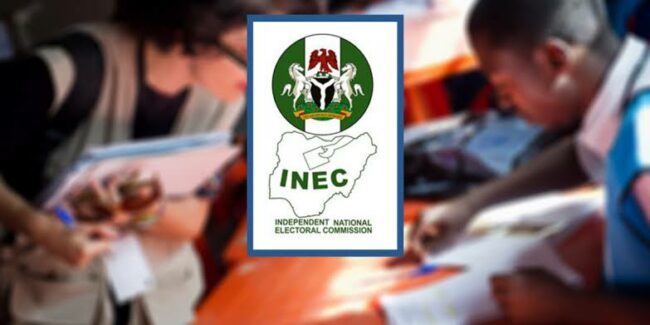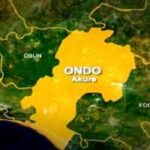Authorities of the Independent National Electoral Commission (INEC) on Friday urged the National Assembly to enact stricter laws prohibiting the possession of large sums of money within polling areas to curb vote-buying and other electoral malpractices.
INEC Chairman, Professor Mahmood Yakubu, issued the charge in Abuja during a consultative meeting with security operatives and the technical committee on electoral law amendments.
The event, organized by the joint Senate and House of Representatives Committees on Electoral Matters in collaboration with the Policy and Legal Advocacy Centre (PLAC) and supported by the UK Foreign, Commonwealth, and Development Office (FCDO), provided a platform for stakeholders to discuss electoral security and legal reforms.
Representing the INEC Chairman, the Director of Litigation and Prosecution, Mr. Tanimu Muhammed, highlighted the growing concern over vote-buying, which has become a major threat to Nigeria’s democratic process.
He noted that politicians often justify carrying large amounts of cash on election day by citing party agent payments and logistical expenses. However, he warned that unrestricted cash circulation at polling units has fueled vote-buying and compromised the integrity of elections.
To address this challenge, Muhammed proposed that individuals should not be allowed to carry more than N50,000 within polling areas.
“Vote-buying remains one of the biggest threats to credible elections in Nigeria. We need legislation that not only criminalizes this practice but also implements preventive measures,” Muhammed stated.
ALSO READ:2025 UTME: Why we won’t extend registration deadline — JAMB
He also urged lawmakers to prioritize amendments that would close loopholes exploited by political actors.
Beyond vote-buying, INEC officials reiterated their long-standing demand for the establishment of an Electoral Offenses Commission, arguing that the electoral body lacks the capacity to effectively prosecute offenders.
“INEC is doing its best to handle prosecutions, but we need a dedicated institution with the legal authority and resources to investigate and prosecute electoral crimes comprehensively,” Muhammed added.
“The creation of an Electoral Offenses Commission would ensure that vote-buying, ballot snatching, and other electoral crimes are met with swift legal action,” he emphasized.
In her remarks, Ondo Resident Electoral Commissioner, Mrs. Oluwatoyin Babalola, stressed that reducing cash transactions at polling units would make it harder for politicians to influence voters through financial inducements.
“If we set a cash limit, security agencies will have clearer guidelines on what constitutes an electoral offense, making enforcement easier,” she stated.
In response to INEC’s concerns, security agencies at the meeting reaffirmed their commitment to ensuring free and fair elections.
However, they acknowledged challenges, particularly in logistics and coordination.
The Commissioner of Police in charge of election planning and evaluation, Abayomi Shogunle, who represented the Inspector General of Police, pointed out that inadequate resources often hamper law enforcement efforts during elections.
“We face major logistical challenges, from deploying officers to remote areas to ensuring real-time communication during elections. These issues need to be addressed if we are to effectively enforce electoral laws,” Shogunle said.
Despite these challenges, security agencies pledged to remain neutral and professional in carrying out their duties.
In his address, Chairman of the House Committee on Electoral Matters, Hon. Adebayo Balogun, assured that all issues discussed would be addressed in future electoral reforms.
He announced plans for a 2025 Electoral Act to replace the current 2022 version, which he said had exposed gaps during the 2023 elections.
“The 2022 Electoral Act was a significant step forward, but its implementation in the last general elections revealed areas that need improvement. We are committed to strengthening our electoral laws to reflect the realities of our democracy,” Balogun said.
He emphasized that, beyond legislative reforms, there was a need for increased awareness among political parties, INEC officials, and civil society organizations on the dangers of vote-buying and other electoral malpractices.
“The Nigerian people deserve an electoral process they can trust. We must ensure that our laws are not just strong on paper but are also effectively enforced,” Balogun added.
Senate Chairman on Electoral Matters, Senator Sharafadeen Alli, noted that while the 2022 Electoral Act was initially considered comprehensive, its implementation revealed gaps that must be addressed.
“This meeting is a step toward strengthening our electoral system. The reforms we propose must reflect lessons learned from past elections and ensure that our democracy continues to evolve positively,” Alli said.
WATCH TOP VIDEOS FROM NIGERIAN TRIBUNE TV
- Let’s Talk About SELF-AWARENESS
- Is Your Confidence Mistaken for Pride? Let’s talk about it
- Is Etiquette About Perfection…Or Just Not Being Rude?
- Top Psychologist Reveal 3 Signs You’re Struggling With Imposter Syndrome
- Do You Pick Up Work-Related Calls at Midnight or Never? Let’s Talk About Boundaries






